After reading the Wild Hunt article on the Community Wreath, Babette Petiot, a French Polytheist living in the Auvergne countryside, decided to begin a community wreath in France. When I read about this project, called Aureole Païenne, I immediately contacted Babette. I was terribly curious about the Pagan experience in France. Which traditions are prevalent? What obstacles do they face? Where do they make spiritual purchases?
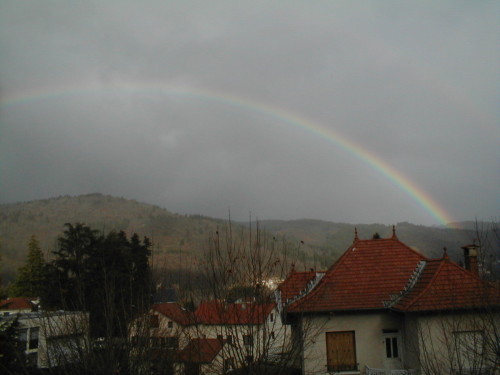
Babette Petiot’s village in the Auvergne countryside
Babette, who is the moderator of the News et liens païens Face Book group, entertained my questions and offered me extensive access to the French Pagan community. With her help, I was able to get a snap-shot of Pagan life in France seen through the eyes of a diverse set of practitioners.
In general, the French Pagan population is small and spread out. “After a quick opinion poll on Face Book we estimate ourselves to be between 3000 and 5000. But it is more a guess than anything,” Babette said. There are no reliable statistics just as in the U.S.
Babette also described the community as young. She said, “We are just getting out of the proverbial broom closet.” Echoing this description was Luc Martel, a Hellenist from Lyon. He said, “le Paganisme français est encore dans son enfance, il reste invisible et informel, même s’il est en phase de croissance.” [Translation: French Paganism is still in its infancy. It still remains invisible and informal even in this growth phase.]
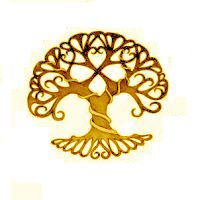 Who is coming out of the broom closet? Which paths are most popular? French Pagan practice spans the spectrum. To name a few, there are Polytheists, Hellenists, Ásatrú, Reconstuctionists, and Alexandrian and Gardnerian witches. However, most of my contacts said that Druidisme is the most popular. Mariane, an Ásatrú and director of the French division of the Pagan Federation International, said “[Druidism seems to be] the best organized and has the largest number of followers.” Ana Lama, Druidress for Communauté de l’Arbre Druidique (CAD), adds:
Who is coming out of the broom closet? Which paths are most popular? French Pagan practice spans the spectrum. To name a few, there are Polytheists, Hellenists, Ásatrú, Reconstuctionists, and Alexandrian and Gardnerian witches. However, most of my contacts said that Druidisme is the most popular. Mariane, an Ásatrú and director of the French division of the Pagan Federation International, said “[Druidism seems to be] the best organized and has the largest number of followers.” Ana Lama, Druidress for Communauté de l’Arbre Druidique (CAD), adds:
We have an important connection to [Celtic] history on our own ground. We try as much as we can to rely on archeological discoveries…Most of our groups are built upon Gallic roots using Gallic tribe names and rituals. Many druidic groups… are affiliated with Great Britain groups.
A few people did speculate that Wicca has the greater following. However, this is difficult to assess because most French Wiccans are self-taught eclectic, solitary practitioners. There are very few covens or organizations outside of Paris and Lyon. The most well-known is the Ligue Wiccane Eclectíque based in Paris. It supports Cercle Séquana and the on-line magazine Lune Bleue. Siannon and Xavier Mondon two Ligue Wiccane members, co-coordinate one of the few Wiccan festivals: the Festival de Déesses.
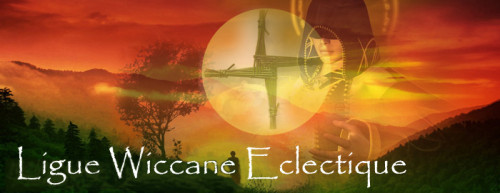
Why are most Wiccans solitary eclectics? The answer is simple: language. To date, the majority of Wiccan books are written and published in English. Therefore non-English speakers have had limited educational resources. Iconic books like Starkhawk’s Spiral Dance and Margot Adler’s Drawing Down the Moon, for example, have never been translated. However, Scott Cunningham’s books are available in French. As a result, many French Wiccans follow his solitary teachings.
Along with reading limitations, there are also very few metaphysical shops. This problem affects all Pagans; not just the Wiccans. Consequently, as best stated by Luc Martel, “Le Paganisme reste encore largement une cyber-religion.” [Paganism is still largely a cyber-religion.] Most communication, interactions and purchases are done online. This cultural phenomenon supports Martel and Babette’s earlier point that the community is, as a whole, “young.” Wide-spread internet usage began less than twenty years ago.
Despite the emerging Pagan culture, Babette says many Pagans are still “deep in the broom closet.” When I first asked why, I expected horrific stories of religious prejudice. But, in fact, I got a very different answer. As Siannon of Ligue Wiccane Eclectíque said, “Religion in general is a bit taboo.”
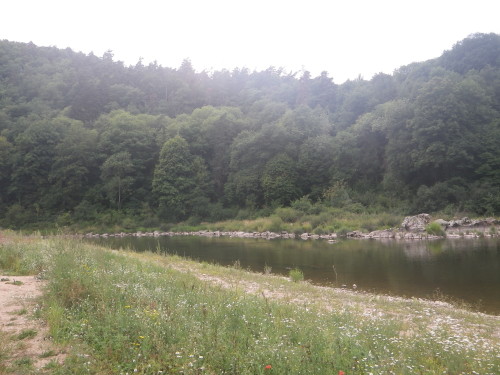
Sacred site along the Loire
The French have a very different relationship with religion than Americans. As Babette explains:
There has always been this vision of [religiosity] as something for the poor, non-educated, or for women. [This] explains partly why secularism is such a big deal. I’m almost sure a French person will far more easily talk you about sex than religion.
To understand this more clearly, it is best to briefly compare the religious ideology between the U.S and France. The U.S. Constitution supports religious freedom by protecting the right to worship. All religions must be included or excluded where appropriate. In France, the law supports religious freedom by legally excluding religion from public life – recognizing none. This is called laïcité or secularism. As an example, in 2004, the French Government banned the wearing of religious symbols in schools including head scarfs, yarmulke, crosses, pentacles etc. Could the U.S. government ever impose such a ban? Consider this PewGlobal comparison. 50% of Americans feel that religion is a very important and 53% said that it was “necessary to believe in God.” In France, the figures are 13% and 15% respectively. Which society is, as a culture, more secular?
Siannon and others argue that French laicité actually means “no religion unless you are Catholic.” In 1995, the State created Miviludes, an office to watch for derive sectaire [Cultic Deviances.] Unlike in the U.S., French law clearly defines cults in an effort to protect its citizen’s safety. In 2009, Miviludes fined a French Scientology group for engaging in fraudulent behavior. Although this is done in the name of secularism, the State’s cult watch is considered a threat to minority religious practice.
Due to this culturally-ingrained secularism, there are very few aggressive public challenges to Paganism. Xavier Mondon of Ligue Wiccane Eclectíque explains: “[People don’t even realize that] there are any pagans left today. For most people, [Paganism] is…old historical stuff.” Most of the population is indifferent or simply unaware. Others confuse it with silly fantasy or “charlatainism” as noted by Xael, a Wiccan eclectic and Shaman. While there are Christian zealots who confuse witchcraft and Satanism, this is infrequent and only happens in the private sector.
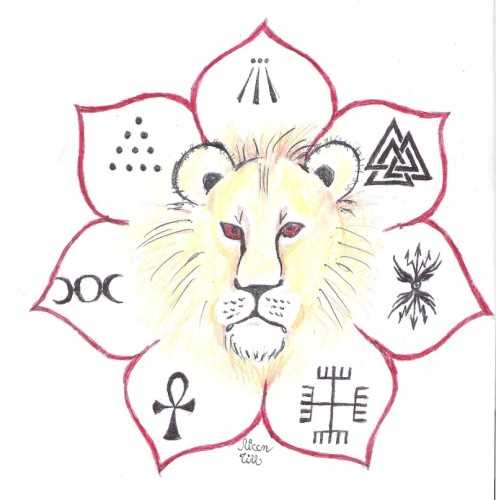
Leanthe, Fleur de Lyon: a symbol of peace and harmony for Pagans in Lyon
Aside from the limitations caused by language, misconceptions and the State’s cult-watch, there is a bigger problem facing the French Pagan community. As best stated by Luc Martel, “Le plus grand obstacle au Paganisme français, ce sont les Païens français !” [The biggest obstacle for French Paganism is French Pagans.] All of my correspondents made this same statement in some form. Christophe, a Gardnerian Witch, blamed the large population of teenage practitioners who don’t know how to perform rituals or organize covens and who believe being a “witch” is trendy. Others blamed hot tempers, egos and individualistic natures. Babette blames the broom closet. She said, “French Pagans are so comfortable “hiding behind their [facades] and the internet [that] they won’t come out.”
However, the culture is changing. Druidress Anna Lama noted, “At this moment we are trying to organize all Druidic groups under a Druidic council called Comarlia.” Along with the PFI, Ligue Wiccane Eclectíque and other such organizations, there are smaller groups forming locally and on the web. Of course, Babette and Luc Martel, with his groups Fleur de Lyon and Café Païen, are working on the community wreath project: Aureole Païenne. Babette remarked, “[We are] trying to be an active community. We have a long way ahead of us and the first steps are to let the different traditions speak to each other and create bridges.” Echoing this hope, Xael said, “Things are changing. In time, I believe Paganism will be recognized as a true spiritual [path.]”
- The French Community Wreath
Note: The original community wreath will be retired during an Ostara ritual at the Atlanta Pagan Market Place of Ideas next weekend. A new wreath will take its place and begin its journey. Babette and Georgia-based NGS have exchanged ribbons to be included on each other’s wreaths. There have been at least two other U.S.-based community wreaths started since the original article was published.
The Wild Hunt is not responsible for links to external content.
To join a conversation on this post:
Visit our The Wild Hunt subreddit! Point your favorite browser to https://www.reddit.com/r/The_Wild_Hunt_News/, then click “JOIN”. Make sure to click the bell, too, to be notified of new articles posted to our subreddit.
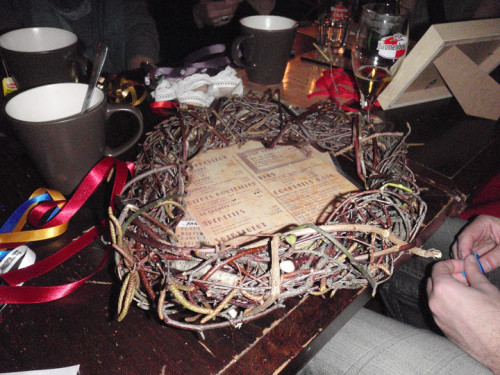
Thank you for this truly fascinating look at how Paganism is developing in France.
Not so recent though… My mother showed me the way years ago, in the early 80s… But she wouldn’t feel the need to make her witchery visible, it was something very personal. But apparently a witch is not necessarly a pagan, following a recent discussion on Babette’s page. Lots of pagans in France think that “pagan” means at least “polytheistic”.. pantheistic and/or animistic is not enough (don’t even think you may be considered “pagan” is you are agnostic or atheistic !)…
Anyway, thank you for this article showing that paganisme does exist in France…
It’s been developing a lot here in Italy too! Mostly in Rome, Milan, Biella, Bari, Naples 🙂 Not too much going on in Florence where I live unfortunately
We have Trivia, a day of conferences, and a Covegno di Druidismo e Wicca a Pagan Camp in Nemi and a Pagan Pride event in Rome among other things
So interesting! Thank you.
This is wonderful, thanks for writing it. I was a French major in college ages ago and got to go over there my junior year so it’s a real pleasure to hear about the Paienes francais! I’m an OBODie too so it’s great to hear that Druidisme is one of the largest of their small groups. 🙂
I’m a Gaulish reconstructionist who moved to France in 2011 and was surprised to find that there are virtually no people identifying as reconstructionists in France. What I did find was that druidism here is different from what I’ve experienced in Scandinavia, in the UK, and online. There is a strong reconstructionist current in the druidism community here. The druids I’ve come in contact with have been very dedicated both to community, to study, and to implementing what they’ve studied into a living system. They have been very inspiring to me.
It’s nice to read an article talking about how things are evolving in here.
As a French pagan myself, I think one of the biggest challenges we face to come out of the closet is the ignorance of most people. Like the article rightfully said, many people are totally clueless about paganism still existing today! Greek, Roman, Celtic or Egyptian gods are all considered to be nothing more than mythology and old primitive superstitious beliefs… Add to that the fact that religions cannot legally be recognized anyway, and it becomes quite uneasy to state what you believe in!
If people had at least a vague cultural understanding that our religions exist then coming out of the closet would mean identifying yourself with a minority. But as it is, coming out of the closet equates with nothing understandable if you don’t give a minimum of explainations yourself… and if you’re talking to someone who most likely never even guessed that there were still any religious paths resembling the old religions, then you’ll probably just look like a crazy person, alone in your belief… You’ll not appear to be part of a minority group, you’ll appear to be just a fool by yourself…
I don’t know if coming out here is more difficult than what it must be like in the US or UK for instance, but it certainly is very different.
“if you’re talking to someone who most likely never even guessed that
there were still any religious paths resembling the old religions, then
you’ll probably just look like a crazy person, alone in your belief…
You’ll not appear to be part of a minority group, you’ll appear to be
just a fool by yourself…”
That was the prevailing attitude in the U.S. in the 1950s and 60s among educated people who were not conservative Christians. (Conservative Christians thought it was all Satanic.) That’s the period I grew up in. To take Wicca or any kind of pagan religion seriously as something one could do in the modern world marked one out as delusional, superstitious, or at least very abnormal. Most people who had such leanings kept quiet about it and thought they were the only ones in the world.
When people did find like-minded others, it was very joyful.
Your comment made my eyes tear up. We’re rather lucky in the States to have a variety of options as far as support systems go even if we choose to be solitary in practice. For what it’s worth, know that there are many of us rooting for you. You are not the lone crazy person by far : )
Thank you for this. Most of what you wrote was in line with what I would expect. So much of the existing Pagan movement is either Anglophone-centric or Northern European, not readily adopted elsewhere without adjustments.
I was surprised to learn that The Spiral Dance has not been translated into French after all these years. It was a best seller, and Starhawk travels to Europe; surely the publisher could sell some copies in France, Quebec, and former French colonies. Is there a strong cultural resistance in France to reading books from Anglo-Saxon authors?
You should probably say ‘English language authors’ rather than ‘Anglo-Saxon’. ‘Anglo-Saxon’ being Old English.
“Anglo-Saxon” at one time was, and perhaps still is, a slightly disparaging term that the French applied to the cultural products and politics of the English speaking world. Since I was writing about French attitudes, I used an adjective I thought a French writer might use. In the same way that Americans tend see ourselves as more freedom-loving than anybody else, the French tend to see themselves as more civilized, cultured and rational than English speakers, hence their giving us a label referencing the Dark Ages.
Perhaps I was being too subtle, but you need not lecture me on historical facts that are common knowledge.
As someone with an interest in the Anglo-Saxon period and a self defining Wessaxon, when someone says ‘Anglo-Saxon author’ I immediately think of people like Stephen Pollington and John Porter before Someone like Starhawk.
Call it a ‘knee-jerk reaction’, if you will.
As a Frenchy, “anglo-saxon” means only “everything linked to UK, USA, and the english-speaking part of Canada : language, culture, way of considering other people, of evoluting, of communicating with others.” In general, there is a “more polite, more self-tempered, a bit of superiority complex” component added to the term. But no “less civilized and cultured than us frenchies” label as far as I know…
FWIW, pretty much the same happens in Spanish — throughout the Hispanic world, and particularly in Spain, it’s common to refer to English-speakers of whatever nationality as Anglo-Saxons (anglosajones), though in a more specific context that term can, of course, also refer to the medieval Germanic people in Britain and to their language.
Seems to be pretty common. In the Celtic languages it’s all pretty much references to Saxons (Sasanach, Saesneg). Even the modern word for English is a clipping from “Saxon language” (Sacs-Bhéarla), though oddly enough the word kept was “language”, and that now applies to English.
I’d be really interested to see why this is done so much in the non-English speaking world, since distinct Saxon culture died out relatively early compared to other European groups.
My guess is because it was the (Anglo) Saxons that first formed the nation of ‘England’ and the name just stuck.
In Finnish, Saksa means German/ Germany.
Thank you.
There’s a pun in one of Lewis Carroll’s Alice books–I don’t remember whether it’s in Alice in Wonderland or Through the Looking-Glass–about “Anglo-Saxon attitudes” that seems to be a reference to this usage. It’s illustrated with a faux-woodcut drawing of Hengist and Horsa gesturing. As a child, I wondered what that was about. Now I’ve finally got the joke.
Interestingly enough, Starhawk’s second book, Dreaming the Dark, was translated into France in 2003 under the title Femmes, Magie et Politique (according to French Wikipedia).
You are correct Dreaming the Dark was published in French but went out-of-print shortly after. It was never widely available.
“The biggest obstacle for French Paganism is French Pagans”
I think that is true everywhere – the biggest obstacle for Paganism is Pagans.
Very interesting article! I’ve always been a bit amazed with how big the American pagan community is, and how intense your discussions can be. This article about paganism in France doesn’t surprise me. I’m Dutch myself, and although we do have small communities here (from covens to people meeting each other once in a while), I feel that generally there is no need to build an out-and-proud large pagan community. It’s interesting to see how this differs in every country – of course depending very much on culture.
I think part of the reason we make such a to-do about being “out and proud” is because we have such a virulent evangelical Christian community in the States. You have to be loud about your rights here or you get trampled on. But then again, we probably wouldn’t have such a virulent evangelical Christian community if our culture viewed religion as more private and personal as many of our European friends do. : )
Yes, I guess that must be (part of) the reason 🙂
I can’t help but feel that secularity is given a bad name. In Canada we don’t have religious freedom in our Constitution, but we do have Constitutionally recognized protections for catholic &
protestant ‘separate schools’, being publicly funded as part of the
agreement to unite Upper & Lower Canada. Which is heavily debated in
politics and many Canadians feel that it should become history ( http://en.wikipedia.org/wiki/Separate_school#Controversy ) And religious schools as a whole do receive some funding in Canada, varying from province to province ( http://en.wikipedia.org/wiki/Education_in_Canada#Religious_schools ). For the most part, Canada sees itself as a secular and especially a multicultural nation. In Canada secular is not interpreted to mean no religion, just that no religion is favored over another. Meaning that everyone is welcome to practice what they like but none are given privileges over another (other than the disputed separate schools), resulting in a great diversity of practices that are free to be. The ‘broom closet’ mostly manifesting in small communities, with virtually all cities having pagan friendly venues and groups. So to me, secular is a really good thing, lest there be an over ruling majority that leads to Theocracy.
– Correction, Don’t have “Freedom Of Religion” explicit like that in the USA. Instead it is categorized under Fundamental Freedoms.
Thank you for this write up. It’s really interesting to hear about our co-religionists on the continent.
There are two key problems that European pagans frequently face (particularly in the continent) which, surprisingly, were not addressed by your correspondents, though Siannon alluded to one of them in saying that laïcité actually means “no religion unless you are Catholic.” Despite widespread secularization (not to mention constitutionally-mandated separation of church & state), the once-dominant forms of Christianity (Catholic, Protestant & Orthodox) still enjoy considerable privilege (in some cases even being entitled to public monies) which is denied to minority religions. Moreover, established Christian churches often use their clout to specifically suppress pagan groups with impunity, resorting to tactics that range from bureaucratic red-tape to the incitement of violence. There is not much that pagans — lacking in numbers and organization — can do, since attempts to engage the authorities or to take legal action have proven futile and/or prohibitively expensive.
The other problem is that, throughout continental Europe (and certainly in France), the term “pagan” has come to be widely associated with neo-fascist, xenophobic, white-supremacist groups, which makes it that much harder for “our kind” of pagans to establish themselves openly without fear or reprisals.
leading French New Right (Nouvelle Droite) thinker Alain de Benoist has written a book called “Being Pagan” in the 1980ies but I do not know if he really perceives himself as “pagan”, his extreme anti-egalitarianism wouldn’t go down well among most pagans … don’t know how it is now but 15-20 years ago there was a self-declared “pagan current” around the university lecturer for medieval history Pierre Vial in France’s main fascist party “Front National” co-operating there e.g. with integrist Catholics (on the French far right an important force), right-wing protestants (mainly not from the historical protestant churches in France which are mostly very secularist and politically liberal or left-wing) and followers of Reverend Mun
Back in the early ’90s (snail mail) we published a magazine for the community called Crow’s Cause. I was very surprised one day to receive from France a large package of a number of Witchcraft newsletters. My guess is they saw my French surname and decided to try networking. Alas, I don’t read or speak French, but the graphics were very interesting. Now this was ’92 or so, and I realize a lot can change, but everything was pretty sexed up. Mostly line drawing but mostly nudes, male and female (a ratio of more females, as you would expect perhaps. There seemed to be more Diabolic-style Witchcraft, ie; nothing that called to Wicca, exactly. Since I could not read them, I never knew what they were really about, but there were quite a few of them. I often wondered if most French Witchcraft was of this sort: highly sexual and a hint of Diabolism.
Has anyone ever seen something like this before, from France or anywhere? It was 20 years ago, so maybe this form of “Paganism” was displaced by other trends?
Yes, I remember finding, many years ago, a couple of “pagan-styled” publications at a little New Age/esoteric shop in Montmartre. One of them was from an organization called “Wicca Française,” which obviously espoused a form of Luciferianism.
Thank you for this interesting article! Being French myself, I can only agree with what is stated here. I would add that there is an other element, I think, which must be taken into account, to understand the lack of visibility of french pagans, and the fact that religion is kind of a taboo: our history! We often forget that the French Revolution was not only about bringing the monarchy down , but also the Church and its privileges. It is in our culture to be rather critical towards religion, whichever form it takes.
Add to that the fact that our culture is deeply rooted into rationalism. Therefore, we have a tendency to see any religion as superstition. As a result, many people, who could find in paganism a suitable answer to their questions about religion or spirituality, because none of the three patriarchal religions appeal to them, just notice that these religions don’t give them the answers they are looking for, and dismiss religion completely, labelling it as irrational beliefs, whithout further considering. (in that sense, Jessilia was saying something very true, that most of us experienced at least once: “if you don’t give a minimum of explanations yourself… and if you’re talking to someone who most likely never even guessed that there were still any religious paths resembling the old religions, then you’ll probably just look like a crazy person, alone in your belief… You’ll not appear to be part of a minority group, you’ll appear to be just a fool by yourself…”
For us, in order to explain our beliefs, it is always easier to start with a cultural/historical approach. I rarely met anyone who wasn’t interested in the fact that the christian holy days are based on pagan celebrations, for instance.
Thank you. The Dutch political situation differs from that in France, but yes, secularism rules here too. And religion is a taboo, in social conversation at Very few will dare to ask what your religious affiliation is. This offers a kind of protection, but religion is often viewed as superfluous, and being religious as un-educated, silly, weird